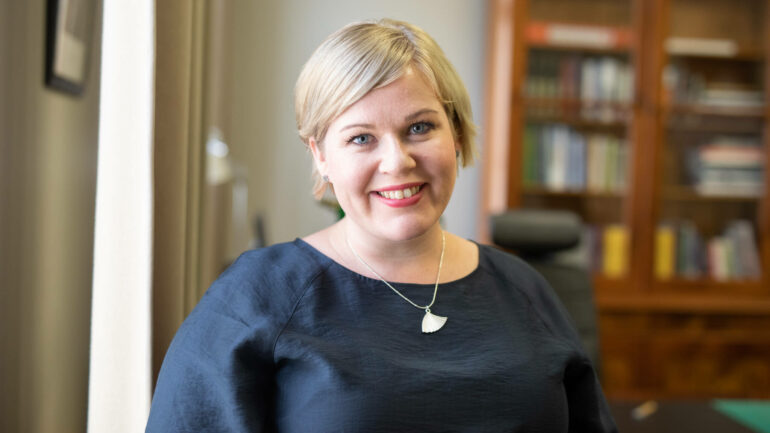Written by: Annika Pham
01.02.21
On Friday, the first session between Nordic industry professionals and public body representatives centred on the protection of Nordic rights holders in the digital age.
The first session of Audiovisual Collaboration 2021 co-organised by Nordisk Film & TV Fond and the Finnish Ministry of Education and Culture - under its Presidency of the Nordic Council of Ministers, was held on the opening day of the Göteborg Film Festival (January 29-February 8).
The discussion between industry professionals and key-decision-makers, centred on the competitiveness of the Nordic audiovisual industry at a time of fast-changing global markets. It was moderated by Nordisk Film & TV Fond CEO Liselott Forsman.
In her introductory speech, Annika Saarikko, Finland’s Minister of Science and Culture underlined the challenging times due to the pandemic, which has “put the resilience of our societies on test." "The crisis has radically affected the operating environment for culture and creative sectors all over the world,” she said, mentioning the need for everyone “to work together.”
Reiterating the Nordic Council of Ministers’ ‘Vision 2030’ three-point strategy for a green, competitive and socially sustainable Nordic region, Saarikko also emphasised the Culture Ministers’ firm commitment to support and further develop the Nordic collaboration in the audiovisual sector. “We have been happy to notice the growing interest of new partners and media companies to join Nordisk Film & TV Fond,” she said.
The Finnish Minister went on discussing the very important role of the cultural, creative and audiovisual industries to free, democratic societies. “Access to culture and art, and the opportunity to practise them freely is also fundamental for our ability to understand, react and act when faced with the situations or challenges-such as a necessary green transition or an unexpected crisis like the Covid-19 pandemic,” she said.
Three industry professionals were invited to submit questions to a virtual panel consisting of Laura Mäkelä, Finnish Ministry’s Counsellor for Cultural Affairs, Anna Serner, CEO, Swedish Film Institute, and Lasse Saarinen, CEO, Finnish Film Foundation and Chair of the Board at Nordisk Film & TV Fond.
Asked by Finnish producer Liisa Penttilä-Asikainen (Kaiho Republic) and Norwegian executive producer Håkon Briseid (Monster) about their position on rights ownership and protection in the digital era, Serner, Mäkelä and Saarinen all agreed that a better protection of Nordic rights holders and transparency from the major OTT players is quintessential. “Producers need to have a better position to negotiate with the platforms,” said Serner.
Saarinen concurred with his Swedish counterpart, saying that protecting rights holders, and making sure IPs remain in the Nordic region, is crucial, especially for the small Nordic countries.
Mäkelä mentioned the delicate balance between market forces and regulations, and said that the role of public sector is to aim to create as predictable and stable working environment as possible for independent producers with enough financial resources. Citing the EU’s Audiovisual Media Services Directive’s 30% quotas of EU works on their services, she said that according to the Commission one option to promote better circulation of European works across borders would be to require for these quotas to apply to EU non-national content, as local content already enjoy quite a good visibility on global streamers. This might well be discussed in the future.
Mäkelä also said the Nordics should be better at gathering data to have a better knowledge of the value of domestic productions in each territory.” We are not doing our homework enough,” she pointed out.
Going back to the EU’s Audiovisual Media Services Directive (AVMSD), still to be implemented in the Nordics, Briseid asked the panellists if they would opt for a soft approach (obligation for global streamers to commission a certain amount of content in local language) or hard approach (levies to be reinvested into film fund budgets). The two film institution representatives said they would favour a levy.
Mäkelä said her services had conducted a survey with Finnish media service and content providers, and the latter as well wanted a tax-based financial contribution from global VOD services. “So far no political decision has been made in Finland. Denmark is working seriously on this issue and we are following what they are doing. We all must be awake. The global market is already here; we can’t avoid not being part of it,” she insisted.
The final question to the panellists was submitted by London-based Michael Nakan (Clipper Media), currently working with Finland’s Luminoir on the noir series Emerald Eye.
Quizzed about whether a pan-Nordic commissioning system could be introduced to ease collaborations notably with the US and the UK, Serner said foreign production partners should trust the existing co-production treaties.
“If the main producers are not from the Nordics, it will be difficult to give them public money, as we support the domestic industry," pointed out Saarinen.
Mäkelä suggested for the Nordic institutes to better collaborate, on a pan-Nordic level, notably through Nordisk Film & TV Fond.
Forsman said the points raised during the session will be kept on the agenda for further discussions. A core idea of the Audiovisual Collaboration 2021 is to allow questions to deepen from discussion to discussion to find as fruitful and concrete answers as possible during the year.
The next Audiovisual Collaboration 2021
will be held at CPH:DOX (April 21-May 2, 2021).
